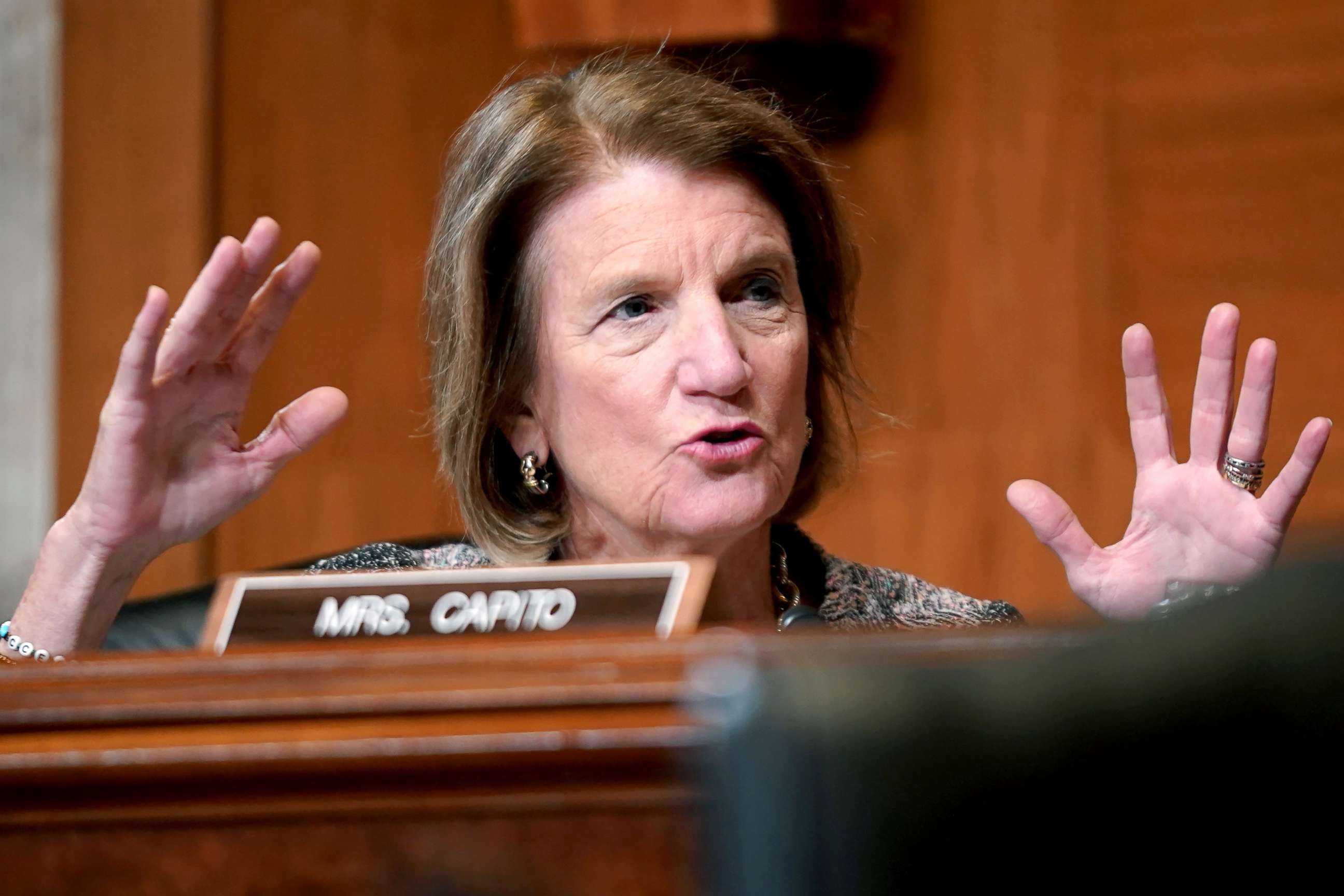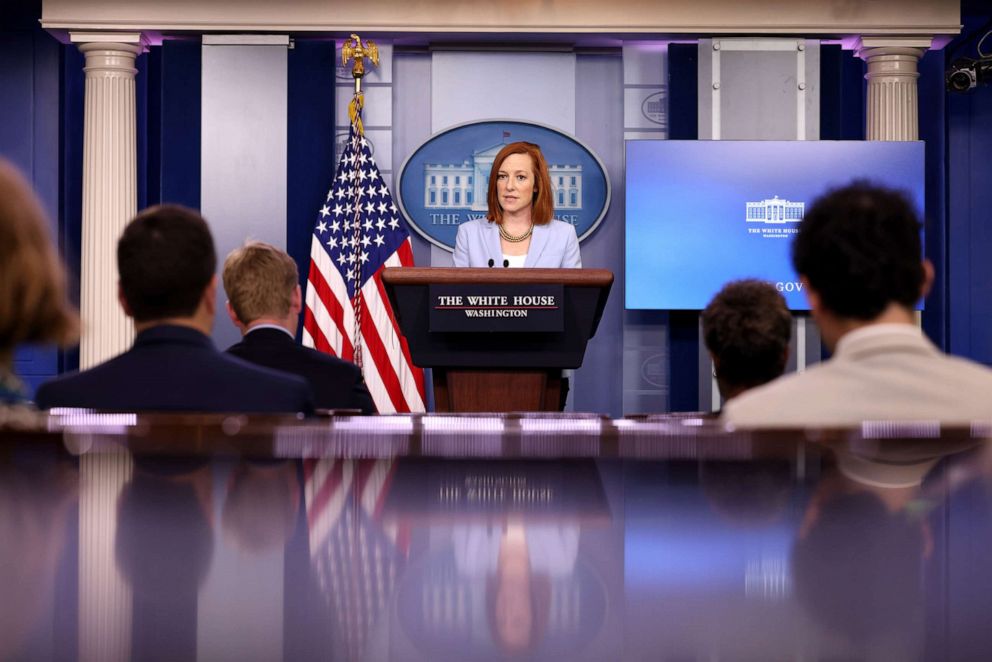Infrastructure negotiations snagged again as Republicans reject Biden's counterproposal
The White House's offer Friday was already a pared down version of its plan.
Bipartisan negotiations on infrastructure hit a new snag Friday after Republicans flatly rejected a counterproposal on the multi-trillion dollar bill advanced by the White House.
The White House's $1.7 trillion dollar offer on Friday was a pared down version of President Joe Biden’s American Jobs Plan, initially valued at $2.2 trillion.
Within moments of receiving the deal, Republican aides rejected it, telling ABC News that the price tag is too high for the GOP to stomach.
A spokesperson for West Virginia Sen. Shelley Moore Capito, who is leading the Republican effort to strike a bipartisan compromise on infrastructure, said in a statement Friday that the Biden package is “ well above the range of what can pass Congress with bipartisan support.”

“There continue to be vast differences between the White House and Senate Republicans when it comes to the definition of infrastructure, the magnitude of proposed spending and how to pay for it,” said Kelley Moore, a spokesperson for Capito.
In a press briefing Friday, White House press secretary Jen Psaki touted the new White House figure as a solid compromise on the part of the administration.
"This is the act, the art I should say, of seeking common ground," Psaki told ABC News’ Senior White House Correspondent Mary Bruce. "This proposal exhibits a willingness to come down in size, giving on some areas that are important to the president."

White House deputy press secretary Andrew Bates put out a statement Saturday echoing that sentiment.
"The President put forward a reasonable offer in the interest of finding bipartisan common ground that includes critical investments in our infrastructure to create middle-class jobs and strengthen our competitiveness in the world, as well as cuts to his original proposal and a way to pay for it. The ball is now in their court to respond with a good faith counter-offer," the statement said.
According to a copy of the White House proposal obtained by ABC News Friday, the White House shaved $550 billion off its initial proposal by dropping funds for manufacturing, research and development, and also cutting spending for broadband expansion and roads, bridges and traditional infrastructure.
But it’s hardly enough to satiate Republicans, who hoped Biden would adopt a more narrow view of what defines infrastructure in this new offer. Biden’s counterproposal insists on keeping funds for items the White House refers to as “human infrastructure,” like funding for home care and child care, which Republicans have always rejected.
The White House argues in the offer letter that because they are willing to drop research and innovation funding, Republicans ought to let them keep care initiatives.
"Because the president is taking off the table for purposes of these negotiations a significant category of investment that you have argued is not infrastructure, he believes fairness dictates that you consider investments in areas that he believes are vital but are not currently included in your roadmap," the proposal says.
Negotiations over how to fund the massive package also remain stuck.
Biden proposed funding his robust infrastructure plan by hiking the corporate tax rate, a non-starter for Republicans who see this as a referendum on the 2017 Trump tax bill, which some consider the most significant legislative achievement of the former president's tenure.
"We're not interested in reopening the 2017 tax bill. We both made that clear to the president," Senate Minority Leader Mitch McConnell said following a meeting at the White House between Biden and the four Congressional leaders last week. "That is a red line."
In an offer to the White House presented earlier this week, Republicans proposed funding the bill in part with user fees, like tolls, that ask those utilizing new infrastructure projects to help foot the bill.
The White House offer on Friday rejected that idea, claiming such taxes would increase the “burden on working Americans.”
"Our approach should ensure that corporations are paying their fair share," the White House offer says.
However, it did not specify whether Biden is open to a 25% corporate tax rate, as he has suggested in the past, or whether he is still pulling for his original offer of 28%.
Republicans were optimistic after a meeting with Biden last week, but with a Memorial Day deadline set by Biden, they'll advance into their final week of the legislative session on seemingly more uneven ground than ever before.
“Based on today’s meeting, the groups seem further apart after two meetings with White House staff than they were after one meeting with President Biden,” Capito’s spokesperson said.
With optimism waning after Friday’s White House offer, Democrats could soon attempt efforts to go it alone, using a procedural tool called reconciliation that would allow them to bypass the 60-vote threshold normally needed to pass legislation in the Senate.
But moving legislation this way requires unanimous support of all 50 Democratic Senators in the evenly divided Senate, and it’s not clear at this point that Biden would have that on a package that includes “human infrastructure”.
West Virginia Democratic Sen. Joe Manchin has said he supports a smaller, more narrowly tailored package, not unlike the one that Republicans initially proposed. McConnell has predicted that a large package wouldn’t see a single Republican vote.
For Biden, who often touted his ability to bring Republicans and Democrats together on the campaign trail, going forward without Republican support could cost him political capital.
At an ABC News town hall in October, Biden said, “There’s going to be, I promise you, between four and eight Republican senators who are going to be willing to move on things where there’s bipartisan consensus."
ABC News' Molly Nagle contributed to this report.




